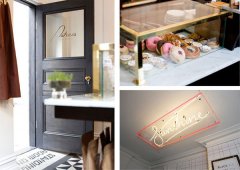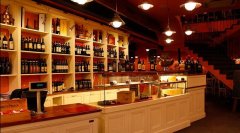Behind the rapid expansion of coffee with you and diffuse coffee: coffee is just a prop.
Communicating with Zhuang Jingyang, founder of Dajia Tea, he revealed the real reason behind the success of many cafes and teahouses-not selling tea and coffee, but selling space. This is why Korean coffee shop brands have been invincible recently.
The most popular coffee shop brand in China's first-and second-tier cities in the past two years is neither Starbucks nor COSTA, but a variety of cafes with Feel: coffee with you, diffuse coffee, zoo coffee, Hollis coffee and so on. These cafes are all founded by Koreans.
The Koreans got the true biography of the coffee god?
The "factions" of the common cafes on the market are: European-style coffee shops represented by French and Italian coffee: special emphasis on the quality and taste of coffee beans, summed up in a popular sentence: private shops with craftsman spirit; American cafes represented by Starbucks: mainly emphasizing professionalism, speed and strong business atmosphere, slowly evolving into the second office of urbanites Taiwan coffee represented by the above island coffee, old tree coffee and real pot coffee: successfully combining coffee culture with China's unique leisure culture, fighting landlords while drinking coffee is only seen here.
The Korean cafe is a complete reappearance of the plot of Korean TV dramas: giving you a short break from reality with more gorgeous space than you can imagine. Coffee? Come on, it's just a little prop!
Highlight several popular Korean cafe brands:
Coffee with you: Korea's largest coffee chain, since its establishment in 2008, has more than 900stores in Korea, in addition to coffee, but also sells a variety of high-end tea, lattes, fruit juices, waffles, breads and so on, there are more than 1200 global chain stores. Entered the Chinese market in March 2012 and quickly blossomed in first-and second-tier cities.
Zoo Coffee: founded in 2009, it has more than 100 stores by 2011, making it one of the hottest chain cafes in South Korea. Founder Kim Jianyou, a very energetic young Korean, explained that he wanted to introduce Zoo Coffee to China: "the coffee market in South Korea is saturated, and there is still a lot of room in China."
Man Coffee: this cafe is even more interesting. The founder is a Korean named Xin Zixiang, who started a business in Beijing. Headquartered in Beijing, the first store, Beijing Lido, opened in January 2011 and opened more than 60 stores by the end of 2013, with the first 36 stores said to be profitable. Man Coffee takes the way of direct operation and cooperation, which accounts for 25%, 35%, and 65%, 75% of the shares in stores. It is a miracle that such a coffee brand with no background, no brand story and no abundant capital can develop to this extent in a short period of 3 years.
Hollis Coffee: founded in 1998, it is the first branded coffee chain in Korea and now has the same number of stores as Starbucks in Korea. It is one of the top four coffee brands in Korea. In March 2013, Hollis Coffee China opened its first store in Chegongmiao, Shenzhen, and in the second half of the same year, the global flagship store opened in Shenzhen's Happy Coast. Lin Dan, the 2014 badminton champion, joined in and opened the first Hollis Coffee Shop in Beijing.
Why are Koreans so successful in the coffee shop segment?
1. The entrepreneurial spirit of Koreans who are constantly seeking change.
In the past, a Taiwanese uncle talked about the characteristics of Taiwan businessmen, to the effect that the reality of the island makes the Taiwanese not atmospheric enough, but the limitations of the natural environment and resources have fully stimulated the potential of people. Koreans and Japanese are probably similar, this characteristic can not be copied, because of the national character.
2. Koreans have an inexplicably good sense of design.
From the movie "my savage girlfriend", we can feel that 13 years ago, Koreans were far ahead of China in their understanding of color, composition and details. Since then, Koreans continue to occupy a very important position in the field of web design and game design. Perhaps it is the natural sense of design that directly widens the gap with the taste of the cafes run by Chinese tuhao. Jin Jianyou has never studied design, but the feeling of design is surprisingly good, and he is alone in all the design ideas and implementation.
3. The success of Korean cultural export.
Some people say that South Korea has done one thing in the past decade, constantly carrying out "cultural aggression" with music, movies, and TV dramas, and the result of perseverance is of course a success. Korean products are synonymous with fashion, romance and beauty in the eyes of young people.
4. Coffee is by no means the only thing that makes money in Korean cafes.
But a variety of desserts and foods with exquisite tableware, fresh ingredients, bright colors and creative dishes. Waffles are usually sold in cafes for no more than $20, but at Hollis or Man Coffee, waffles are placed on a nice plate and squeezed with cream or chocolate for $35 or more.
Important Notice :
前街咖啡 FrontStreet Coffee has moved to new addredd:
FrontStreet Coffee Address: 315,Donghua East Road,GuangZhou
Tel:020 38364473
- Prev

Patricia Melbourne Cafe-- A passionate home that loves coffee
Patricia is a unique coffee shop in Melbourne. Bowen, the founder of the brand, has an unforgettable affection for coffee. He feels that he should give his passion for coffee a home, a real home, so Patricia coffee shop was born. This is the brand image design done by Beyond the Pixels Design Studio.
- Next

How to create a cafe atmosphere in coffee shop management
When customers choose a place for consumption, they will choose their favorite cafe and environment. When drinking coffee, they will respond not only to the physical and substantive attractiveness of coffee, but also to the whole environment, such as service, advertising, impression, packaging, fun and other incidental factors. And one of the most important factors is the leisure environment. If we further reduce the size of the model
Related
- What documents do you need to go through to open a coffee shop? coffee shop coffee shop certificate processing process
- How to purchase Coffee beans in small Cafe how to choose a suitable supplier for domestic Coffee supply Company
- How to drink Starbucks Fragrance White Coffee? how to make Australian White Coffee? what Italian coffee beans are recommended?
- The Story of Flora Coffee: the name of Flora Coffee Bean and the implication of the Flowers on Florna Coffee
- How much does a cup of coffee cost? How much is the profit of a cup of coffee? What is the profit of the coffee shop in a year?
- Yunnan small Coffee, known as "fragrant Coffee", introduces the characteristics of Alpine Arabica Coffee producing areas in Yunnan, China
- 2023 latest Starbucks full menu price list how much is a cup of Starbucks coffee what is better to drink the most popular hot and cold drinks recommended
- Starbucks different kinds of Coffee Price list Starbucks menu 2023 Top Ten Best drinks in Starbucks
- Starbucks Spring praise Comprehensive matching Coffee Bean theme Story Packaging implication and taste description
- The cost of a cup of coffee latte American coffee cost price and selling price

